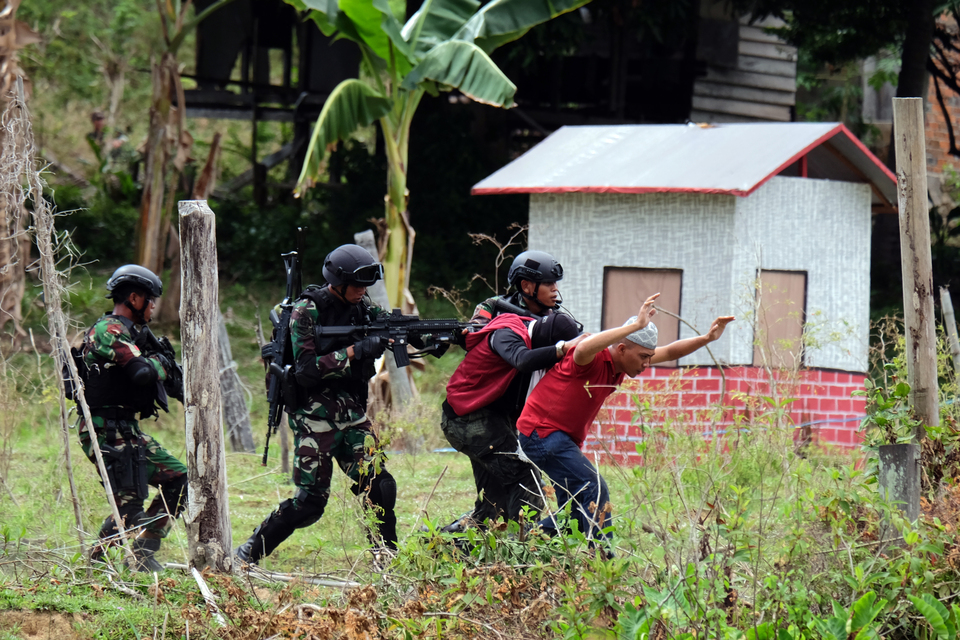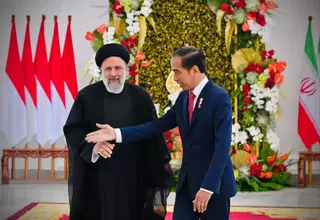Indonesia's 'Red Scare' Stokes Unease Over Military's Growing Influence

Jakarta. Indonesia’s military elite are openly stoking public anxiety about communism, gays and other ‘foreign influences’, a drive critics say is aimed at seizing a greater role in civilian affairs of the world’s third-largest democracy.
However, the military’s crackdown on suspected communist activity and ambitions to create a massive civilian defence force are beginning to create unease within President Joko Widodo’s administration.
Joko last week publicly rebuked the military after it detained a handful of Indonesians suspected of spreading communist ideology, the first public resistance by the president to the military’s growing influence in everyday life.
“The president has firmly and clearly told the military and police chiefs to bring their forces to order,” Cabinet Secretary and presidential aide Pramono Anung told reporters.
Under Joko, the military has joined the nation’s fight against drugs, terrorism and corruption, areas previously reserved for the police.
But a line was crossed this month when soldiers briefly detained two student activists in eastern Indonesia for wearing red T-shirts emblazoned with a picture of a hammer and sickle inside a coffee cup.
It was the latest in a string of military and police raids against suspected left-wing radicals.
“The reason the local military command gave (for the detentions) was that the men were spreading communism through T-shirts,” said Abdon Nababan, head of the organization to which the two activists in North Maluku province belong. “We protested because military soldiers cannot arrest, interrogate and confiscate property of civilians.”
A local military spokesman declined to comment on the detentions.
Security forces have also recently begun seizing leftist books from citizens in an apparent attempt to prevent a feared revival of communism.
Armed Forces spokesman Tatang Sulaiman said the military is working within the law.
“If we find groups spreading communist ideology...or materials that can influence the thinking of the public, then we will act according to the law. Our role is to help the police,” he told Reuters.
Investigate Massacre
The crackdown has coincided with Widodo’s order for an investigation into an anti-communist purge of 1965, a move that irked some within the military elite.
Historians say at least a half-million people were killed in violence that began in October 1965, after suspected communists killed six generals in an attempted coup against then president Sukarno. Successive governments have refused to apologise or accept that death toll.
Indonesia back then had the largest non-ruling communist party in the world, and it was supported by China.
Under the authoritarian Suharto who took over from Sukarno, the party was dissolved and all leftist materials and symbols -- even Chinese characters on signs and in the media -- were banned.
Critics heard echoes of that era in the central Javanese city of Yogyakarta, where an anti-communist group that included children of military and police officials recently prevented the screening of a workers’ rights movie deemed too left-leaning.
“The event was not at all about communism. It was a film about workers,” said Suarjono, an organizer of the screening.
For the military, memories of 1965 are still raw.
“Who was it that rioted and killed military generals at the time? It was the PKI (the communist party),” Defence Minister Ryamizard Ryacudu told Reuters in an interview. “Don’t look for justification. I don’t like that.”
“We tried to eradicate them (communists) in the past so it’s possible they want to get revenge,” Rymizard said.
“Definitely, there is a connection with 1965,” he said when asked about the recent increase in suspected communist activity.
Defend the Country
Ryamizard said the military hoped to establish nearly 900 training centres this year for a civilian defence corps known as “Bela Negara” (defend the country).
Its mission is to defend against “proxy wars” waged by communists, gays, religious militants and other “foreign influences”, who want to divide the country and degrade its moral and nationalist values, the military says.
The training centres will teach millions of students, doctors, civil servants and others survival skills, first aid, and Indonesian history - but no weapons training.
“Bela Negara is a direct response to the threats we face from proxy wars,” said Hartin Asri, a military officer in charge of the programme.
The Indonesian military has a history of being involved in civilian affairs dating back to independence from the Dutch in 1947. Under a doctrine known as dwifungsi (dual function), the military was granted power over civil and political affairs to promote nationalism and development.
The doctrine was largely jettisoned after Suharto fell from power in 1998, but it still has adherents in the military.
“There are efforts within the senior ranks of the military to create this sense of paranoia that suggest that Indonesian nationalism needs to be re-ignited,” said Sidney Jones, a Jakarta-based security expert.
“The military genuinely believes it has the solution to getting Indonesia back on track.”
Additional reporting by Agustinus Beo Da Costa and Yuddy Cahya
Reuters
Tags: Keywords:POPULAR READS
China’s Top Diplomat Wang Yi to Visit Indonesia for Cooperation Talks
Chinese top diplomat Wang Yi will chair a policy coordination meeting aimed at strengthening Indonesia-China cooperation.President Jokowi Urges Global Restraint as Tensions Rise in the Middle East
President Joko "Jokowi" Widodo emphasized the importance of diplomatic efforts to prevent the escalation of conflict in the Middle EastKPK Identifies Sidoarjo Regent as Suspect in Corruption Probe
KPK has identified Ahmad Muhdlor Ali as a suspect in a corruption case involving the Sidoarjo Regional Tax Service AgencyEconomic Concerns Overshadow Security Worries for Indonesians in Iran
Indonesian citizens currently in Iran are more concerned about rising inflation than the security situation in the country.'Siksa Kubur' Review: Indonesian Horror with Solid First Act
The beginning part of "Siksa Kubur" is incredibly solid across many fields, including the visual storytelling.Popular Tag
Most Popular






















